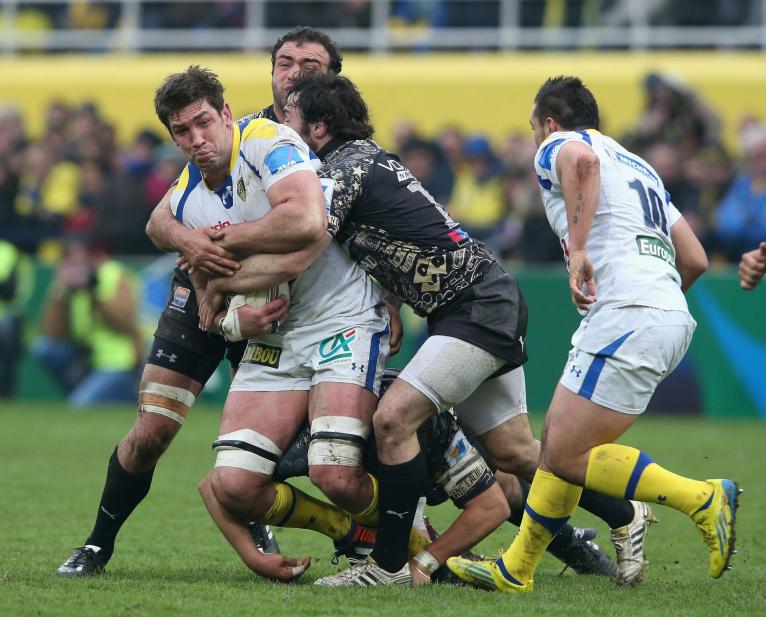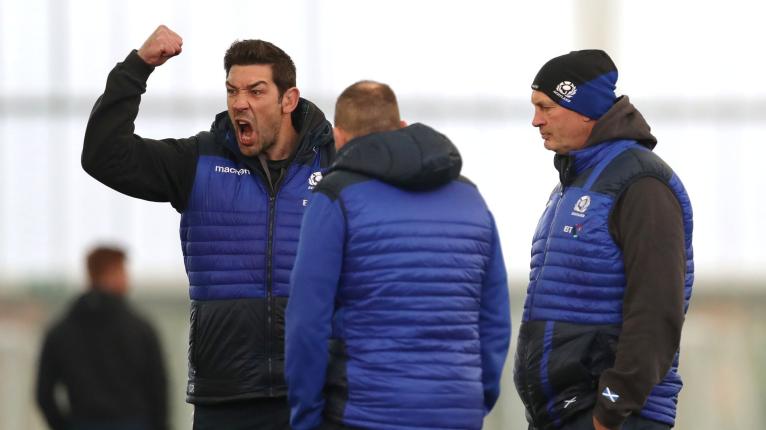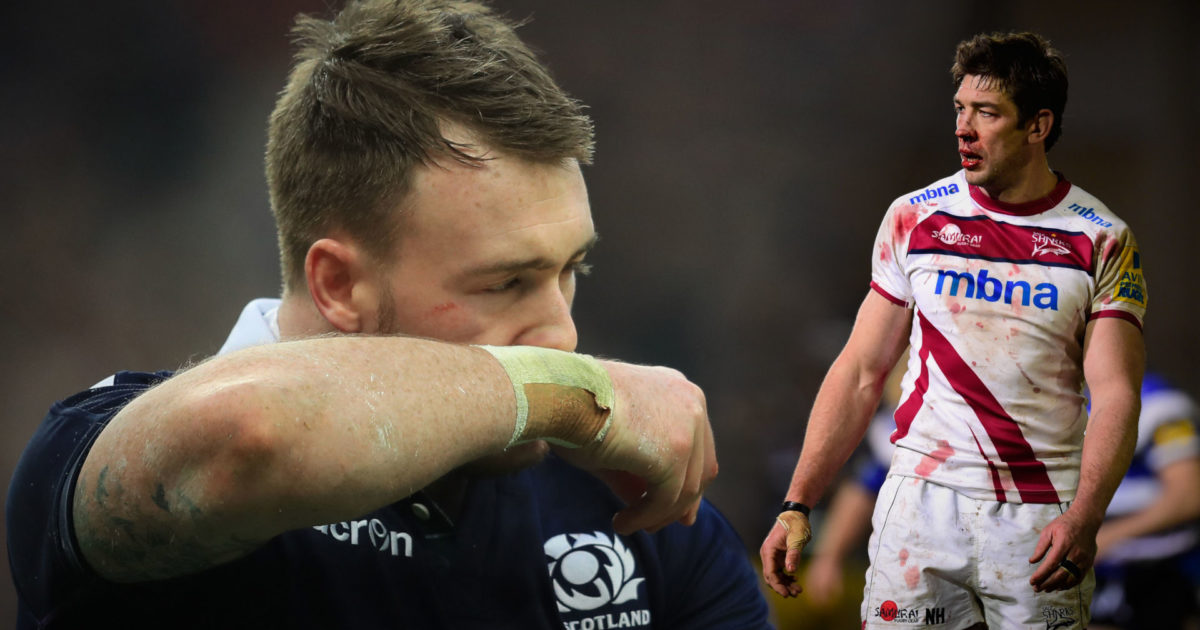'I was on the sideline going, f***, I only retired a year-and-a-half ago and this is ridiculous'

Before we get to the savagery of modern rugby, life in France and with Scotland and the years of graft under the brilliant Vern Cotter, there’s something obviously different that strikes you about Nathan Hines. It’s not his hulking form – that much is certain. At 44, he still looks like he could do a very useful turn in the engine room. You fancy, if he had the choice, that’s exactly what he’d be up to, rather than the forwards coach post he has held at Montpellier for the past three years.
Look a little closer, though. The glint in the laptop monitor isn’t simply an overexposed webcam. Are those shiny dental appendages braces? The lip-shredding train track numbers for which a plook-ridden teenager might get mercilessly teased?
“Yup,” Hines says, grabbing at a silver bracket on his canine. “I got the braces on about eight months ago, so the contact training is out, but before that, contact was on. You never really want to stop but your body tells you that you need to. I still do the training with the boys, all the running and the stuff before.
“I had a tooth on the bottom that really protruded and the dentist said it would keep getting worse and worse and push further and further and I kept biting myself. Because I played rugby, I could never get braces on, but now I thought I’d get it done. And at the same time, Josh, my 11-year-old, got his done too. The health insurance here is pretty good.”
Somehow, you can’t imagine anyone taunting the colossal father or his boy about these snazzy additions to their chompers. Hines was a snarling beacon of longevity in a sport where brutality mounted by the season. Born in New South Wales, he came to Scotland in 1999 on something of a backpacking venture that sparked a glorious 16-year voyage taking him to the very peak of European rugby via Edinburgh, Perpignan, Leinster, Clermont and Sale Sharks. He retired in 2015 with 77 caps and a Lions tour to his name and joined Cotter’s Scotland coaching staff before the gruff Kiwi took him to Montpellier.
‘I was having so much fun holding them down that I couldn’t stop myself.’
The colossal Nathan Hines on Cotter, France, project players, and wrangling Ulstermen.
Coming soon, @RugbyPass pic.twitter.com/2IMz5DuLo2
— Jamie Lyall (@JLyall93) April 29, 2020
Hines played in World Cups and semi-finals and finals and is still revered in Dublin for his part in propelling a magnificent Leinster team to their crazy Heineken Cup triumph of 2011.
He was famously uncompromising, and an extremely intelligent footballer. There is a notorious clip of him wrangling three meaty Ulstermen against their will in a furious European battle with Clermont.
“I remember thinking to myself, this is silly, what am I doing?” he chuckles. “But then I was having so much fun holding them down that I couldn’t stop myself. I was just stupid, wasn’t I?
“I could have let go a lot earlier and it would have been fine. I was getting punched in the face by Pedrie Wannenburg and the more he punched me in the face, the more I wanted to hold onto him.
“I just don’t like losing. I don’t think it’s got anything to do with being confrontational. When I get poked at, I don’t like it. Did I ever go out purposely looking for confrontation? Not really. But I didn’t mind giving a bit of niggle or just being uncomfortable for people now and then.
“How long can I hold these three guys down for? What can I do to you? You’re not going to beat me; I’m going to get you to do something to make us win. Although my competitiveness probably got me in trouble more times than not.”
If ever a game was wild enough to make Hines wince, then it can safely be placed in the ferocious category. When he talks about the bludgeoning visited upon today’s players, it is worth paying attention.
There the big fella stood on the Stade de France touchline in 2017, running the water and the messages for Cotter inside the Parisian cauldron, watching as one by one, Scotland’s players were carted wounded from the paddock.

Greig Laidaw wrecked his ankle, John Barclay was taken off concussed and so too was his replacement John Hardie minutes after. The same fate befell Alex Dunbar and Fraser Brown later in the match. Josh Strauss, somehow, lasted the course despite damaging a kidney and being lost for the remainder of the championship.
“I was on the sideline going, fuck, I only retired a year-and-a-half ago and this is ridiculous. The amount of stress on players’ bodies at the moment is really bad,” Hines says. “The load, especially in the northern hemisphere, is huge. In the south, it’s not as bad – but still bad.
“The Covid-19 pandemic is an opportunity to reduce load on players, especially in France where we start mid-August and go right through to June, it’s not amazing.
“Jason Ryan from the Crusaders came up to see us at Montpellier, and I went down there, and their season is so short that they get time to work on their coaching, the players get time to work on their development and their interests outside of rugby. I think it’s a good time to sit back and work out where we can keep players healthy.”
The answers to these sprawling and complex questions are not simple. From the pandemic and the political jousting between Bill Beaumont and Agustin Pichot, the hope is that a closer alignment between north and south emerges, the unlikely utopia a global calendar.
At the moment, Hines fears, there’s simply too much rugby, especially in France, where the mammoth Top 14 season leaves players like hamsters scuttling on a wheel. Clubs must field a minimum of 14 “JIFF” (Joueurs Issus des Filières de Formation) players per match-day squad. As explained by rugby Francophile James Harrington, to be JIFF-eligible, a player must have spent “at least three seasons in a French academy before the age of 21, or been licensed to play in France for five seasons before turning 23”.
“JIFF spots are increasingly more expensive,” Hines says. “That’s bad. We get average JIFF players being paid way more than they should because they’re JIFF.
“If I need a JIFF hooker, an agent knows I need a JIFF hooker, so he’s going to put the price up and you need so many JIFFs on the team. Georgia had nearly as many JIFFs as the French did last year – they come in to the academies early but will never play for France, which is a bit of a flawed system.
“And a player could play every game of the Top 14 season. If you lose the first couple of games, you want to put your best side out, but you can’t rotate too much because you’re limited by JIFF, but all your French players are injured or away with the national team. You’ve got the same guys playing over and over again. You’ve got 26 games plus Europe, plus any other finals or friendlies. It’s tough.
“I don’t know how they’re going to do it, because in the Top 14 all the presidents want a home and away fixture. But if you had 10 teams in the top division, and they played home and away, that’s six fewer games, so that’s not too bad.”
Convincing the supremos of French rugby to trim the league is likely to be about as straightforward as brokering peace on the West Bank, but for now, Hines has more pressing matters to conquer.
The past year has been a little upsetting, with his mentor and friend Cotter shunted upstairs to what felt like a ceremonial director of rugby position and eventually out of the club. In came Xavier Garbajosa with a reputation as a new-age man of sexy innovation and an impressive stint at La Rochelle behind him. The reality, for Hines, has been vastly different. Montpellier will finish the abandoned Top 14 in eighth place and were punted out of the Champions Cup at the pool stage.
“Vern values your input, he gives you responsibility – he gives you enough rope to hang yourself, basically,” he says. “He’ll tell you the destination and you find your own way, and he’ll guide you to reach it.

“Xavier and I are not too compatible as people and as coaches. We don’t see the game the same way, and that’s not a big deal at all, but you want to make sure you can voice your opinion and it is taken on and discussed.
“Rugby is a complex game and you need different views, different angles. Obviously the head coach makes the decisions but you want to make sure you give him all the information you can.
“It’s difficult when you want to help the team but it’s not a discussion, it’s not a group thing, it’s just, ‘I’ve decided this and that’s the way it is’. That’s what has happened this year. You try to voice opinion and it gets shut down and shut down.
“Ever since the start of the season it’s been difficult. And when he brings in another forwards coach, you know the writing’s on the wall.”
No surprise, then, that Hines won’t be back at Montpellier next term. He won’t be heading to Fiji with Cotter either. He doesn’t feel ready to become a number one yet, and didn’t put himself forward for the Glasgow job when Dave Rennie’s departure was announced.
At the moment, the family are mired in uncertainty, with the sale of their house falling through when the pandemic struck and no coaching offers forthcoming.
“We had agreed to sell the house, then the Covid hit and the people pulled out, and now we haven’t had viewings because of the isolation. So we have a house that we sold that now hasn’t, and we don’t know where we’re going. That’s a little bit stressful but it’s outwith my control, the whole thing.
“I’ve got nothing lined up yet. I’m looking for a home but with the current situation it’s difficult. It’s been a bit quiet.
“My agent has been talking, trying to find me a place to go. But I dunno, no-one is looking for a coach who still thinks he’s a player, apparently.”
With his immense experience and integrity, Hines has masses of nous to offer a player group. And maybe, once the braces come off and that unruly tooth has been hauled back into formation, a few bruising lessons still to teach.

































































